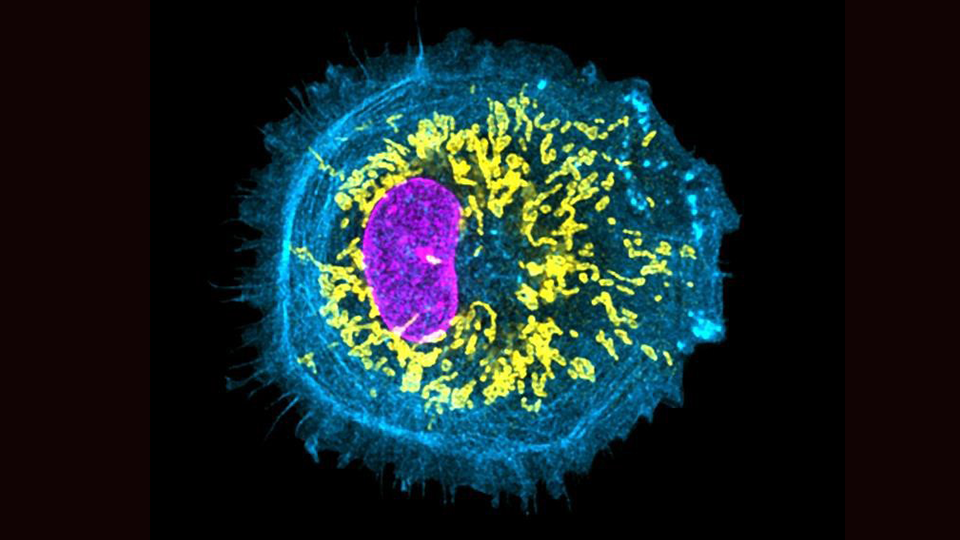New study reveals the critical role of microglia in human brain development
Published: 15 Nov 2023

Super-resolution image of human stem cell-derived Microglia cells with labeled mitochondria (yellow), nucleus (magenta), and actin filaments (cyan). These Microglia cells help in the maturation of neurons in human brain organoid models. Photo credit: A*STAR’s SIgN
An international team of scientists has uncovered the vital role of microglia, the immune cells in the brain that acts as its dedicated defense team, in early human brain development.
By incorporating microglia into lab-grown brain organoids, scientists were able mimic the complex environment within the developing human brain to understand how microglia influence brain cell growth and development. The study, “iPS-cell-derived microglia promote brain organoid maturation via cholesterol transfer” was published in Natureon 1 November 2023.
To investigate microglia’s crucial role in early human brain development, scientists from A*STAR’s Singapore Immunology Network (SIgN) led by Professor Florent Ginhoux, utilised cutting-edge technology to create brain-like structures called organoids, also known as “mini-brains” in the laboratory. These brain organoids closely resemble the development of the human brain. However, these brain organoids were lacking in microglia, a key component of early brain development.
To bridge this gap, A*STAR researchers designed a unique protocol to introduce microglia-like cells generated from the same human stem cells used to create the brain organoids. These introduced cells not only behaved like real microglia but also influenced the development of other brain cells within the organoids.
A*STAR’s Institute of Molecular and Cell Biology (IMCB)’s Dr Radoslaw Sobota and his team at the SingMass National Laboratory for Mass Spectrometry applied cutting-edge quantitative proteomics approach to uncover protein changes. Their analysis provided crucial insights into the protein composition of the organoids, further confirming the study’s findings.
What sets this study apart is the discovery of a unique pathway through which microglia interact with other brain cells. The study found that microglia play a crucial role in regulating cholesterol levels in the brain. The microglia-like cells were found to contain lipid droplets containing cholesterol, which were released and taken up by other developing brain cells in the organoids. This cholesterol exchange was shown to significantly enhance the growth and development of these brain cells, especially their progenitors.
Cholesterol, makes up about 25% of the body’s total cholesterol content, is abundantly present in the brain and is essential for the structure and function of neurons. Abnormal cholesterol metabolism has been linked to various neurological disorders, including Alzheimer’s and Parkinson’s Disease.
To investigate the roles of lipids in brain development and disease, researchers from the Department of Biochemistry at the Yong Loo Lin School of Medicine (NUS Medicine), led by Professor Markus Wenk, took on the crucial task of data acquisition, particularly in the field of lipidomics to draw valuable insights into the lipid composition and dynamics within the brain organoids containing microglia.
Using this information, another team from the Department of Microbiology and Immunology at NUS Medicine and led by Associate Professor Veronique Angeli, found that cholesterol affects the growth and development of young brain cells in human brain models. Microglia use a specific protein to release cholesterol, and when this process is blocked, it causes the organoid cells to grow more, leading to larger brain models.
Moreover, Dr Olivier Cexus from the University of Surrey and formerly at A*STAR, progressively deciphered the complex molecular interactions within the brain organoids using proteomic and lipidomic analysis. This provided valuable insights into the metabolic cross-talks involved in brain development and potential implications for diseases.
Together, these collective efforts were instrumental in deepening our understanding of the roles of microglia and the molecular components within brain organoids and its implications for human health.
Click here for the media release.

